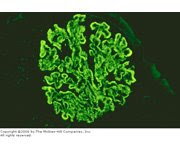 I went to a very memorable talk today at our Renal Grand Rounds during which fairly convincing data was presented that identifies the long-sought-after antigen which causes membranous nephropathy--still the most common cause of adult-onset nephrotic syndrome in whites.
I went to a very memorable talk today at our Renal Grand Rounds during which fairly convincing data was presented that identifies the long-sought-after antigen which causes membranous nephropathy--still the most common cause of adult-onset nephrotic syndrome in whites.The presenter (Larry Beck of Boston University Medical Center) described a fairly straightforward approach: he took serum from patients with membranous nephropathy and used it on Western blots of normal human kidney tissue. In about 70% of cases of idiopathic membranous nephropathy (but in 0% of cases of secondary membranous nephropathy and 0% of other nephrotic syndrome states such as FSGS and diabetic nephropathy), Western blotting reveals a 189kD band, which is identified as M-type phospholipase A2 receptor. We don't know much about the protein's function, but it does appear to be present in podocytes, and IgG4 antibody against this protein can be eluted from membranous nephropathy biopsy specimens. Interestingly, in some patients this 189kD band disappears after successful treatment with standard membranous agents, implying that an ELISA test may be an effective way of monitoring these patients (much like the ANCA is used for Wegener's granulomatosis, for instance).
The data is not yet published but chances are good it will end up in a high-profile journal soon.
















No comments:
Post a Comment